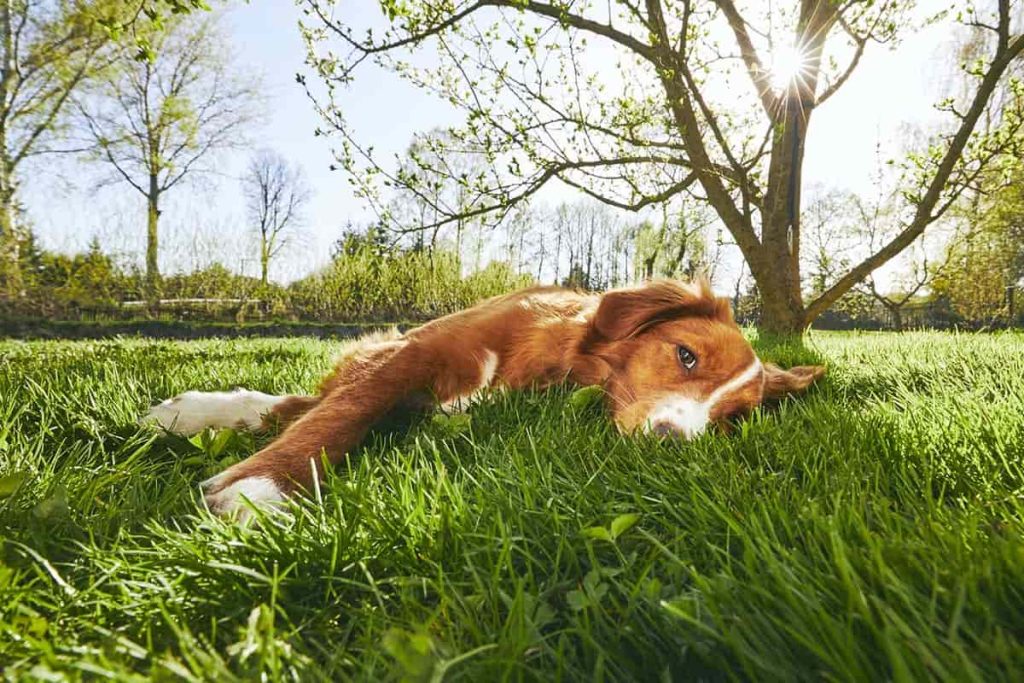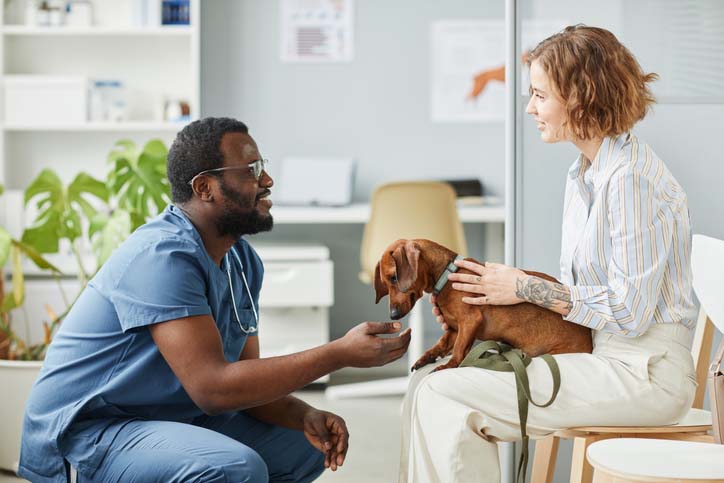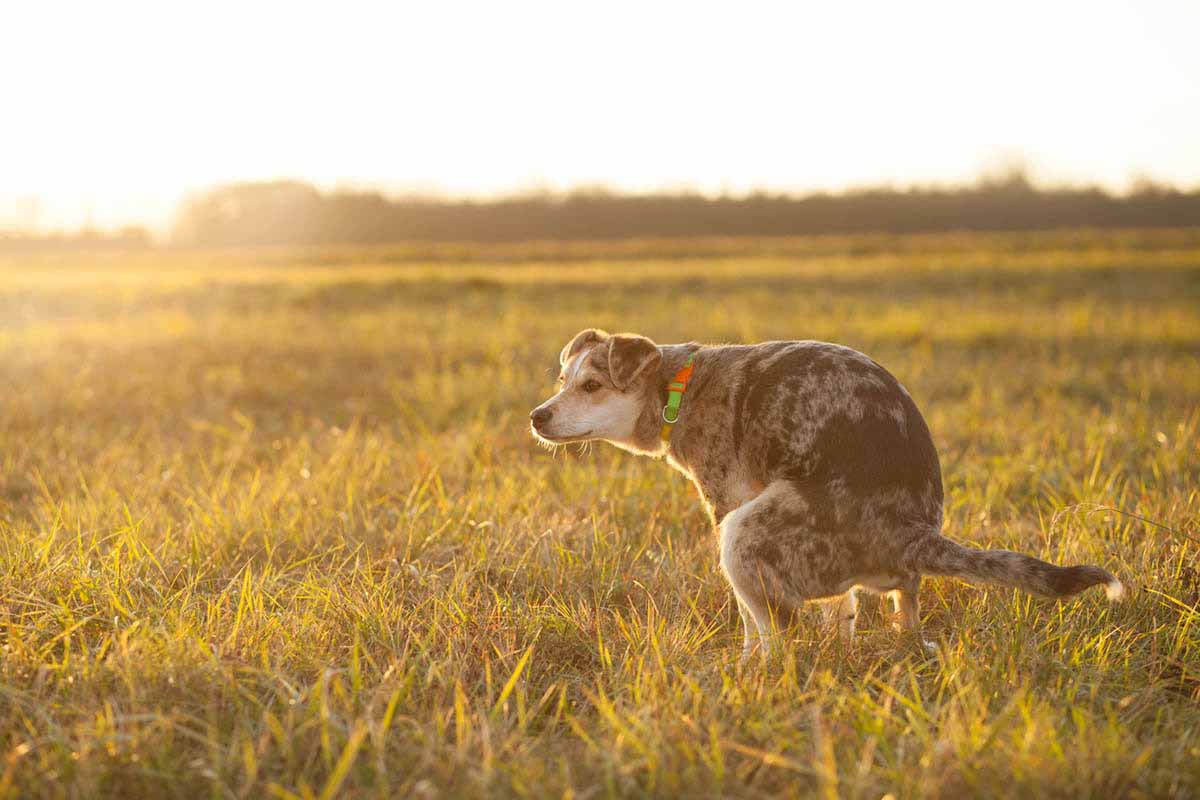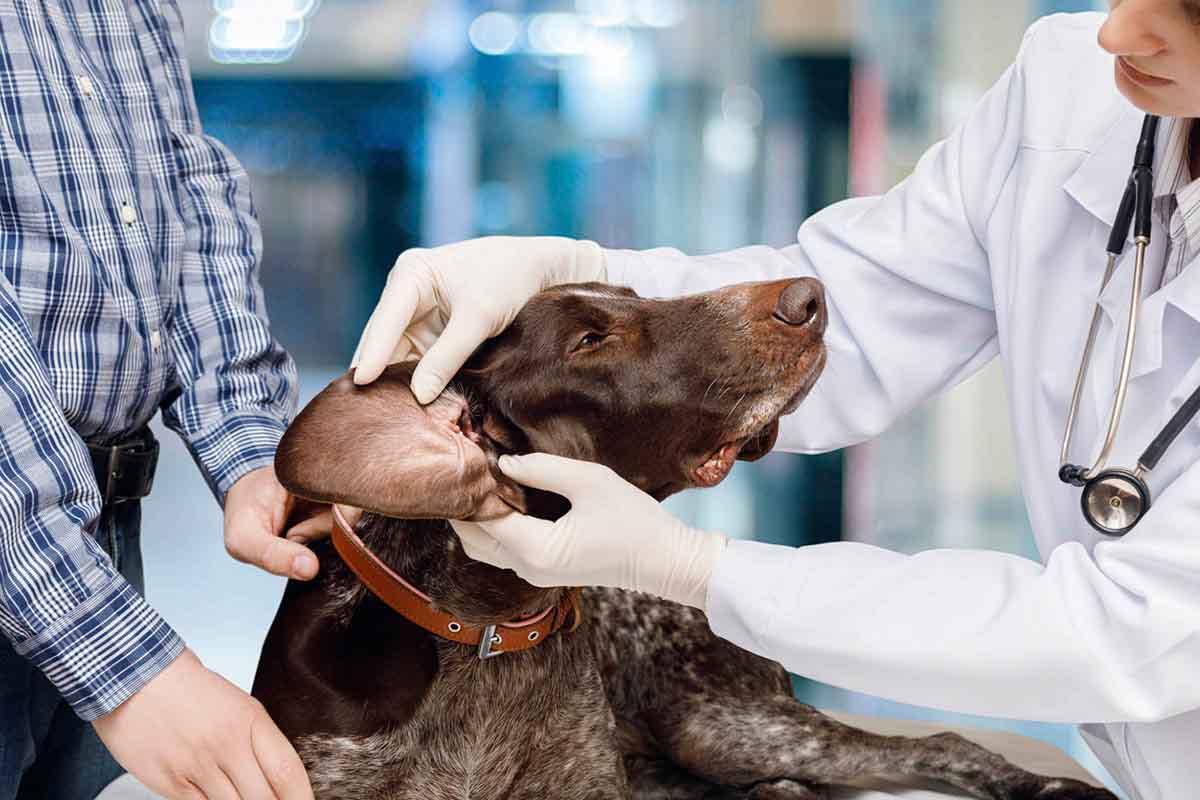How to Help a Constipated Dog
Dog constipation can be a big problem. You might be wondering how to help a constipated dog, when you need to be worried, and what can you do to help your buddy be more comfortable. Let’s take a look at this uncomfortable digestive issue.
It’s a little embarrassing, but you know how it feels to be constipated and have difficulty with a bowel movement. You know how uncomfortable it is, and naturally, you don’t want your best friend to have to go through that kind of discomfort.
Dog constipation, like human constipation, can be a big problem. So, you might be wondering what are the causes of constipation in dogs, when you need to be worried, and what can you do to help your buddy be more comfortable. Let’s take a look at this uncomfortable digestive issue.
Signs of Constipation in Dogs

Let’s start with the basics, and what’s more basic than the signs your dog is having problems defecating?
According to the American Kennel Club, there are several signs of dog constipation:
- Lack of defecation for a few days or more.
- Hard stools or very dry stools — these can be so hard, you’ll think they’re a rock.
- Tenesmus, which simply means straining to defecate with little or no results — your pooch might produce a small amount of liquid feces, and it might have some blood in it, but he’s not producing much.
- Scooting on the floor or ground to try to move things along.
- Dyschezia, which simply means painful defecation — you might hear your buddy yelping a little as they try to defecate.
- Obstipation is the result of severe constipation that has caused your furry friend to retain hard, dry feces for a prolonged period of time. If your buddy has obstipation, he won’t be able to defecate.
Causes of Constipation in Dogs
There are several possible causes of constipation in your dog. The most common cause is often that he has ingested something that is irritating or that his digestive tract can’t digest. For example, many long-haired dogs have problems with constipation because of the hair they ingest when they groom themselves.
That is not the only cause, however, as there are many other causes of constipation in dogs, including the following:
- A blockage from something he has eaten that has become lodged in his intestines. This is clearly a very serious problem that requires emergency medical treatment.
- Diseases common in a dog’s digestive system that can cause chronic constipation, like certain neuromuscular problems that affect the colon.
- An enlarged prostate can cause secondary problems, like a swollen bladder, that can ultimately result in constipation.
- Certain medications, including diuretics, narcotic pain relievers, and antihistamines.
- Injuries or abnormalities of the pelvis can make it difficult to pass stool.
- Tumors or other types of masses in the colon or rectum.
- Dehydration, which results when your pooch doesn’t get enough water and makes stools very hard and difficult to pass.
- Megacolon, which is a condition in which the colon is enlarged and the movement of the colon is weakened.
- Certain hormonal diseases like hypothyroidism or hyperparathyroidism.
- Lack of exercise, which can result in a slowing of the movement of the intestines and more water resorption.
- Neurological diseases that can alter the normal movement of the intestines.
- Fear or anxiety that alters your dog’s ability to have normal bowel movements.
- A sudden change in diet.
When Should You Take Your Constipated Dog to the Vet?

Of course, it’s always best to get your pooch to the veterinarian as soon as you know he has a problem, and constipation can become a very serious problem. That said, it may not be practical or even necessary if it’s a short-term thing. You might be able to resolve it with certain home remedies.
So, how can you know when it’s time to go to the vet?
Long-term Constipation
If your dog’s constipation is chronic, meaning long-term, it’s time to go to the vet. Chronic constipation can lead to obstipation, where dried fecal material gets stuck in the intestinal tract. What’s more, obstipation can contribute to megacolon, which is when the colon becomes distended and can actually lose the ability to move feces along.
Painful Defecation
If you see that your dog is in pain when trying to defecate, it’s time for a checkup. He might be in pain because his anal glands need to be expressed, or there might be something more serious going on.
Other Symptoms
If your dog is experiencing other symptoms of a bigger problem, such as vomiting, a bloated appearance, or lethargy, it’s time for a visit to the vet. This is particularly true if he is bloated and trying to vomit or defecate, as that is a sign of a very serious condition that could quickly become lethal.
Another symptom you might see that can indicate a bigger problem is blood in the stool. When your pooch is trying to pass hard stools, that can cause some bleeding, and usually, that’s nothing to be concerned about. But darker-colored blood that’s coming from higher in the intestinal tract can indicate a more serious problem.
Come Prepared
If you do determine it’s time for a visit to the vet, you want to come prepared. That means taking a stool sample if possible, but you should minimally take note of your dog’s stool color and consistency.
You’ll also want to tell the vet when he last had a bowel movement as well as any recent changes to his diet or routine. It’s also important to tell your veterinarian if you think he might have eaten something like a toy or some kind of toxic substance.
Of course, you’ll also want to provide your dog’s medical history, including any injuries or medications he’s on. That will help your veterinarian make the best diagnosis and prescribe the best treatment options.
How Do Veterinarians Diagnose Constipation in Dogs?
Most of the time, your veterinarian will be able to diagnose constipation following a medical history and physical examination. They can usually feel a firm, distended colon when they palpate your dog’s abdomen.
Your DVM may also need to do a rectal examination to rule out problems like a narrowed passage, tumors, foreign bodies, or other abnormalities. They may also want to take X-rays to make sure there is no obstruction higher up in the dog’s digestive tract.
It’s also possible they will want to conduct other laboratory tests like blood tests or a urinalysis to look for underlying causes like hypothyroidism or other health problems. In some cases, an ultrasound may be required, and if a mass is found, your DVM might also want to conduct a biopsy.
It’s also a good idea to bring a sample of your dog’s stool, so your vet can test for parasites or signs of other infections that can affect your dog’s health.
How Is Constipation Treated?
Most of the time, constipation is pretty easy to treat. It may mean giving your pooch a stool softener, laxative, or an enema, but once things get moving, the problem is resolved. There are a number of medications your veterinarian might use to get the flow going, including dioctyl sodium sulfosuccinate (Ducosate®) or cisapride (Prepulsid®).
Of course, if your vet determines your dog is not adequately hydrated, they may recommend replacement fluids to correct the problem. If your dog’s constipation is caused by something more serious like a tumor, for example, then he may need more invasive treatment.
This might mean surgery or lifelong medical or dietary management. Your veterinarian might also recommend a high-fiber or low-fiber diet, depending on the underlying cause of your dog’s constipation.
Your veterinarian might also recommend changing your dog’s diet, taking supplements such as probiotics, or medications that treat problems like hypothyroidism. If your dog experiences pain when he defecates, he might need his anal glands expressed, and that might become a regular intervention as well.
For psychogenic causes of constipation, such as anxiety or fear, your veterinarian might recommend behavioral modification through training or other types of medication that can alleviate his fear.
Home Remedies for the Treatment and Prevention of Constipation

Home remedies can help you get things moving again, but it’s always best to consult with your veterinarian before you add supplements or make other changes to your dog’s diet or normal routine.
That said, here are a few home remedies that can be used to keep constipation at bay:
Canned Pumpkin
The fiber in pumpkin pie filling (the plain pumpkin kind with no other additives) may help with both constipation and diarrhea. Canned pumpkin works well for mild constipation by bulking up your dog’s stool and adding moisture to make the feces pass more easily. Moderation is important because too much can cause diarrhea.
Feed Wet Dog Food
Feeding your dog fresh frozen dog food or canned dog food may help because it adds moisture to help regulate your dog’s digestive tract.
Some Other Foods Might Help
Foods high in fiber, like fig paste, have been shown to help with constipation in dogs and humans alike. This can help prevent constipation, but olive oil is one food that helps treat it by greasing the wheels, as it were. Always check with your vet before giving your dog any of these.
Hydration is Key
It’s vital for many reasons to ensure your best friend has plenty of fresh water. For constipation, this helps because the main job of the large intestine is to absorb excess water. If your dog doesn’t have enough water in his system to begin with, absorbing what’s there will result in hard stools that are difficult to pass.
Supplements
Giving your dog fiber supplements may help. Electrolyte supplements may also be beneficial by keeping his system balanced. Stool softeners can help soften stools when he’s having difficulties. Of course, you want to ask your veterinarian before giving any of these.
Exercise
Studies have shown that exercise can help alleviate constipation in humans, and it’s also helpful in dogs as well. Exercise lowers the time it takes for food to move through the large intestine. This limits the amount of water resorption that takes place there. That means stools will be softer and easier to pass.
Fresh Food Diets May Help
Research has shown that fresh food diets reduce defecation frequency, and fewer calories are shed through defecation. That means that fresh food diets offering human-grade nutrition produce significantly more metabolizable energy than dry kibble diets, and that adds up to better nutrition for your pet.
This content is for informational use only and does not replace professional nutrition and/or medical advice, diagnosis, or treatment. It is not a substitute for and should not be relied upon for specific nutrition and/or medical recommendations. Please talk with your veterinarian about any questions or concerns.
Gao, Ruitong, Yujia Tao, Changli Zhou, Jinwei Li, Xige Wang, Lei Chen, Feng Li, and Lirong Guo. 2019. “Exercise Therapy in Patients with Constipation: A Systematic Review and Meta-Analysis of Randomized Controlled Trials.” Scandinavian Journal of Gastroenterology 54 (2): 169–77. https://doi.org/10.1080/00365521.2019.1568544.
Tanprasertsuk, Jirayu, LeeAnn M Perry, Devon E Tate, Ryan W Honaker, and Justin Shmalberg. 2021. “Apparent Total Tract Nutrient Digestibility and Metabolizable Energy Estimation in Commercial Fresh and Extruded Dry Kibble Dog Foods.” Translational Animal Science 5 (3). https://doi.org/10.1093/tas/txab071.
Oh, Hong-Geun, Hak-Yong Lee, Min-Young Seo, Young-Rye Kang, Jung-Hoon Kim, Jung-Woo Park, Ok-Jin Kim, et al. 2011. “Effects OfFicus Caricapaste on Constipation Induced by a High-Protein Feed and Movement Restriction in Beagles.” Laboratory Animal Research 27 (4): 275. https://doi.org/10.5625/lar.2011.27.4.275.
“Disorders of the Stomach and Intestines in Dogs – Dog Owners.” n.d. Merck Veterinary Manual. https://www.merckvetmanual.com/dog-owners/digestive-disorders-of-dogs/disorders-of-the-stomach-and-intestines-in-dogs.







